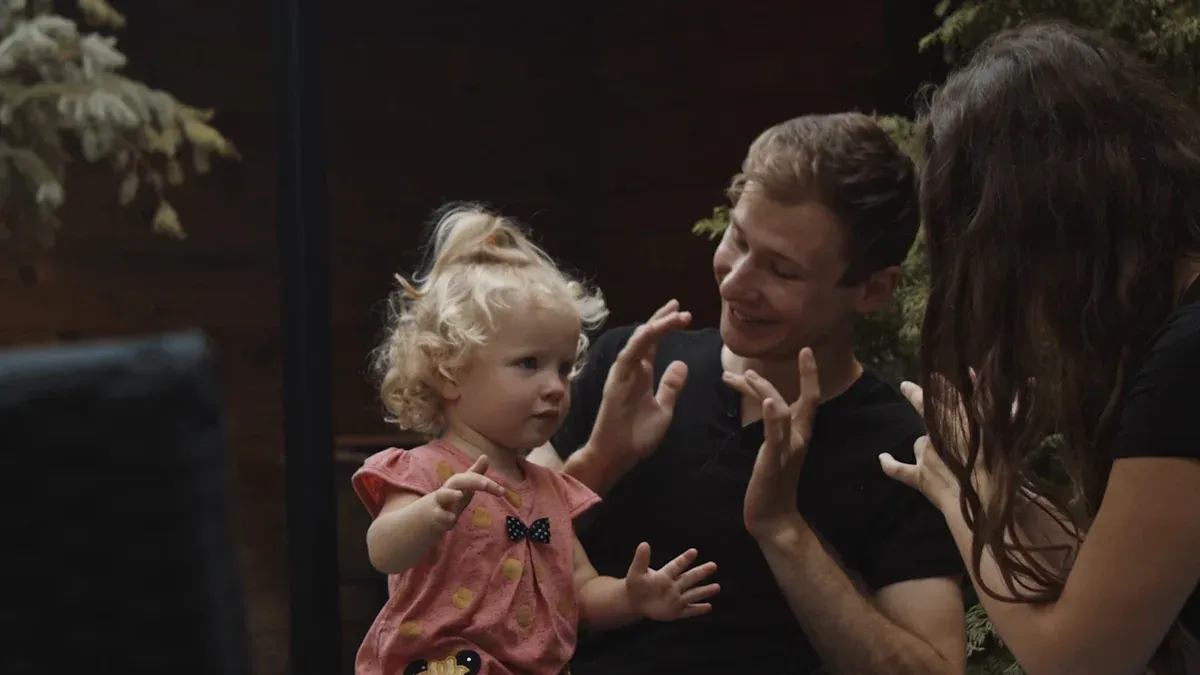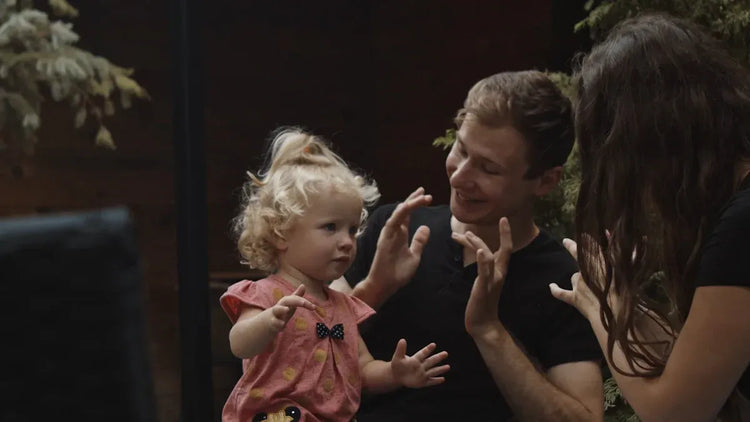
Hearing children born to Deaf parents have an important role in society. They live in two different worlds—Deaf and Hearing—which helps them connect these two groups. In 2025, Hearing children born to Deaf parents will matter even more as inclusivity grows. New technology will also make communication easier for them. Their language skills, empathy, and flexibility are very valuable. These kids don’t just link people; they help create a kinder world.
Key Takeaways
-
Hearing kids with Deaf parents help connect Deaf and Hearing groups.
-
Knowing two languages and cultures helps them talk to many people.
-
They grow empathy by understanding their Deaf parents' struggles in a Hearing world.
-
Tools like AI glasses help them communicate better, making their role important in 2025.
-
Helping these kids creates a kinder world where everyone feels respected.
Understanding the Role of Cultural Mediators
What is cultural mediation?
Cultural mediation means helping people from different cultures understand each other. It closes gaps caused by language, traditions, or social rules. Experts say cultural mediation is shaped by differences and social influences. For example:
|
Aspect |
Description |
|---|---|
|
Mediation Ideas |
Silverstone's ideas lack real-world proof, leading others to study more. |
|
Cultural Differences |
Mediation is affected by how cultures treat and exclude others. |
|
Media and Society |
Social forces shape media creation and use, like institutions and audiences. |
Mediators change their methods to fit how people communicate. For example:
-
Some cultures prefer indirect talks, like private discussions, over open arguments.
-
Good mediators stay fair and respectful while adjusting their methods.
Why Hearing kids of Deaf parents become cultural mediators
Why do Hearing kids of Deaf parents often take this role? They grow up balancing two worlds—Deaf and Hearing. They learn both sign and spoken languages, making them natural connectors. Their daily lives teach them to adjust to different ways of communicating and thinking.
These kids often help their parents by interpreting in schools, hospitals, or jobs. This role builds their empathy and understanding of both cultures. Their unique skills help them solve problems and bring Deaf and Hearing people together.
Why bridging gaps between Deaf and Hearing matters
Closing gaps between Deaf and Hearing groups is key for inclusion. Communication barriers can leave Deaf people feeling left out, especially in diverse communities. For example:
-
Few interpreters from diverse backgrounds make services harder to access.
-
African American Sign Language (BASL) has special features, showing the need for cultural awareness.
-
Students of color face struggles in interpreter programs, which may stop them from studying ASL.
Hearing kids of Deaf parents help solve these problems. They connect both groups, building respect and understanding. By closing these gaps, they create a world where everyone feels important and included.
Skills and Experiences of Hearing Children Born to Deaf Parents
Bilingualism and biculturalism: Knowing sign and spoken languages
If your parents are Deaf, you learn two languages. You use sign language and spoken language every day. This helps you talk with both Deaf and Hearing people. You also understand two cultures deeply. For example, you might enjoy Hearing traditions but also honor Deaf customs. This mix of cultures helps you connect with many people.
Switching between languages and cultures becomes easy for you. You might help your parents by interpreting or teach others about Deaf culture. These skills help bring people together and make everyone feel included.
Empathy and emotional intelligence: Seeing different points of view
Living in a Deaf family helps you see life differently. You notice the struggles your parents face in a hearing world. This makes you more caring and understanding. Studies show Deaf kids may struggle with empathy. But kids like you, who live in both worlds, grow strong empathy by seeing many views.
You also get good at reading faces and body language. These skills help you understand people better. By knowing how others feel, you can build strong friendships and solve problems peacefully.
Adaptability and problem-solving: Handling tricky communication
As a Hearing child of Deaf parents, you face tough situations. For example, you might explain a medical issue to a doctor for your parents. These moments teach you to think fast and adapt. You learn to change how you talk depending on who you’re speaking to.
Solving problems becomes a skill you use often. Think of a leader explaining new rules to her team. She listens and makes sure everyone understands. You do the same by fixing misunderstandings and finding fair solutions. These skills make you a great communicator and problem-solver in any situation.
Why Their Role Matters in 2025
Society is Becoming More Inclusive and Accessible
In 2025, society values inclusion and accessibility more than ever. You can see this in schools, jobs, and public places. But problems still exist. For example:
-
Only half of women feel included in decisions, while 70% of men do.
-
Surveys show gaps in fairness, belonging, and having a voice for many groups.
These facts show we need people to connect different groups. Hearing kids of Deaf parents are important here. They understand different views and help people feel heard. By linking communities, they make the world more inclusive.
New Technology Makes Communication Easier
In 2025, technology changes how we talk to each other. Tools like AI subtitle glasses, such as Hearview Subtitle Glasses, help people communicate better. These glasses turn speech into text with 95% accuracy and work in over 30 languages. They even handle hard words, making them great for work meetings.
Other tools, like cloud systems, help solve problems faster. For example:
-
A global company used these tools to fix issues 40% faster.
-
In Mozambique, mixing old ways with new tech cut problem-solving time by 40%.
These tools show how technology closes communication gaps. Hearing kids of Deaf parents use these tools to help Deaf and Hearing people talk easily.
How They Connect Cultures and Technology
Hearing kids of Deaf parents have special skills to handle change. Growing up with two languages and cultures makes them great mediators. They also learn to adapt and solve problems in both worlds.
For example, they use tools like Hearview Subtitle Glasses to help people talk. By mixing cultural knowledge with new tech, they build strong connections. This makes them very important in a fast-changing world.
Real-World Impact of Hearing Children Born to Deaf Parents
Stories of building understanding between groups
Hearing kids of Deaf parents often connect different communities. Picture a child helping their Deaf parent at a school meeting. This not only supports their family but also teaches teachers about Deaf culture. These kids share their stories with friends, spreading knowledge about Deaf people's lives.
They also help change wrong ideas about deafness. For example, they explain that being Deaf is not a weakness, just a different way of living. By doing this, they help others accept and celebrate differences. Their daily actions build respect and stronger bonds between Deaf and Hearing people.
Speaking up and leading in cultural mediation
Hearing kids of Deaf parents often become leaders and advocates. Growing up in two worlds gives them skills to connect cultures. They understand what both Deaf and Hearing groups need, making them strong voices for change.
Some lead groups that support accessibility and inclusion. They might push for better sign language services or fair workplace policies for Deaf people. Their ability to move between both worlds helps them lead with care and understanding. They inspire others to follow their lead.
Helping schools, policies, and communities grow
These kids also help in schools and community projects. For example, the Individuals with Disabilities Education Act (IDEA) stresses parents' role in schools. Hearing kids often help their Deaf parents talk with teachers, making sure their voices are heard. This builds trust between families and schools, helping everyone.
In policy-making, they share their real-life experiences to guide decisions. They might work with local leaders to improve access or join programs that support inclusion. Their efforts create changes that help many people in their communities.
Hearing kids with Deaf parents help connect Deaf and Hearing groups. They understand both worlds, which builds teamwork and respect. In 2025, their role grows as society values inclusion and new tech improves communication.
-
These kids face unfair views about their parents' deafness. By standing up to these ideas, they learn to care and see others' views.
-
Their lives show the need for better help for CODAs and Deaf parents. Skilled interpreters can ease their load, letting them succeed as bridges between cultures.
Supporting their work creates a kinder and more united future for all.
FAQ
What does CODA mean?
CODA means "Child of Deaf Adults." It describes Hearing kids with Deaf parents. You grow up learning sign and spoken languages. This special experience helps you connect Deaf and Hearing groups.
How do Hearing children of Deaf parents help society?
You link two cultures together. By interpreting, sharing stories, and promoting inclusion, you help people understand each other. Your language skills and kindness make you a great cultural helper.
Why is 2025 important for CODAs?
In 2025, inclusion and technology are growing fast. Tools like AI subtitle glasses make talking easier. As a CODA, your role is key in bringing people together and building understanding.
What challenges do CODAs face?
You might feel pressure to help your parents or deal with wrong ideas about Deaf culture. These struggles teach you to solve problems and stay strong. Support from interpreters and fair policies can make things easier.
How can society support CODAs?
Society can offer more interpreters and teach about Deaf culture. Schools and jobs can be more welcoming. By valuing your work, people can help you succeed as a cultural bridge. 😊


